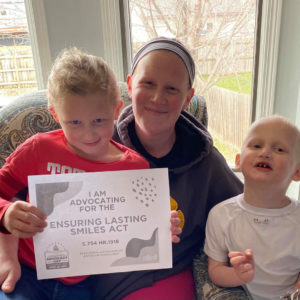By Sarah Ward
My husband, Justin, and I had never heard of ectodermal dysplasia until our daughter, Amelia’s, first dental appointment. A family friend was concerned about how her teeth were coming in and their slow development. She’s a dental hygienist.
At the time, I was about four months pregnant with our son, Lucas. Our pediatrician told us that Ameila was perfectly healthy and not to worry. It was when Lucas was a little over a year old and spiked a 103.6 fever sitting outside in the shade at a 4th of July parade when I knew.
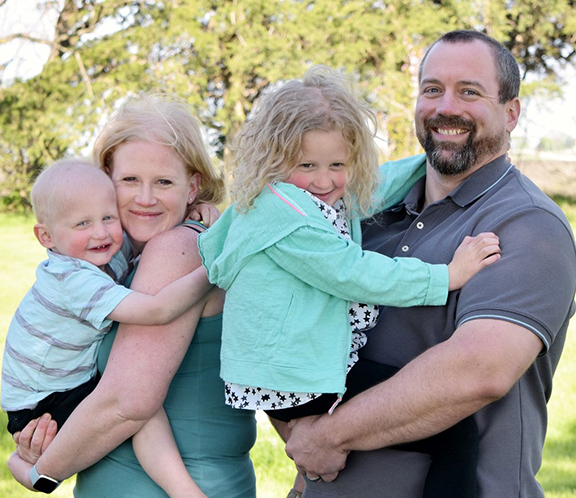
We had moved and now had a new pediatrician who was aware of ectodermal dysplasia enough to know the symptoms and get us into the University of Iowa for testing. We have a clinical diagnosis of x-linked hypohidrotic ectodermal dysplasia (XLHED). They found a genetic anomaly but we are the only three people known to have this particular anomaly, so it cannot be listed as the cause.
Knowing that both children have this and that it came from me, I can find a few minimal symptoms that I display. But, they would have never led us to a diagnosis.
Finding the NFED
Justin found the National Foundation for Ectodermal Dysplasias (NFED) website and Facebook which we looked through. We used the website a LOT when we first got our initial diagnosis and still some now. I love reading the blog posts! The NFED’s Facebook page and groups have been immensely helpful as well. I try to speak up and ask more questions in the groups to learn and hopefully help others who have questions.
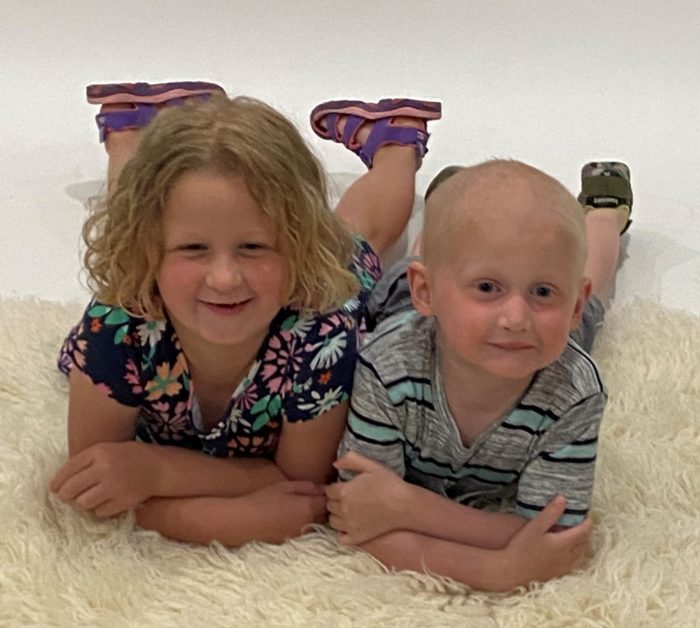
We have been lucky on the medical front and have a great team. The kids’ dentist is going above and beyond to make sure we have the best care plan set up for Amelia and Lucas. He gets more excited than I do when finding teeth that we may not have been expecting. Amelia is missing six baby teeth and x-rays show she’s missing eight permanent teeth.
Lucas only has four baby teeth but x-rays shows two more that have not yet come in. Missing teeth has created a lot of speech issues for Lucas. I only understand about 70% of what he says and others are lucky if they understand half of what he says.
Having the NFED community has helped a LOT with coping with symptoms. We have also learned that what works for others doesn’t always work for us.
How I Became an Advocate
It wasn’t until we met the Steele family that we really got involved with the NFED. It was December of 2018 and I commented on a Facebook post for the NFED. Jen Steele had noted she was in the Des Moines metro area and I was excited to find another family who was close to us. She answers all my questions no matter how silly they may seem. She knows experiences not just from their family but other families as well. Their family has helped more than they may ever know.
Our families met for dinner one night and Jen was talking to me about the Ensuring Lasting Smiles Act (ELSA) and why it was so important. In that moment, I knew that I needed to do something to help, no matter how scared and nervous I may have been.
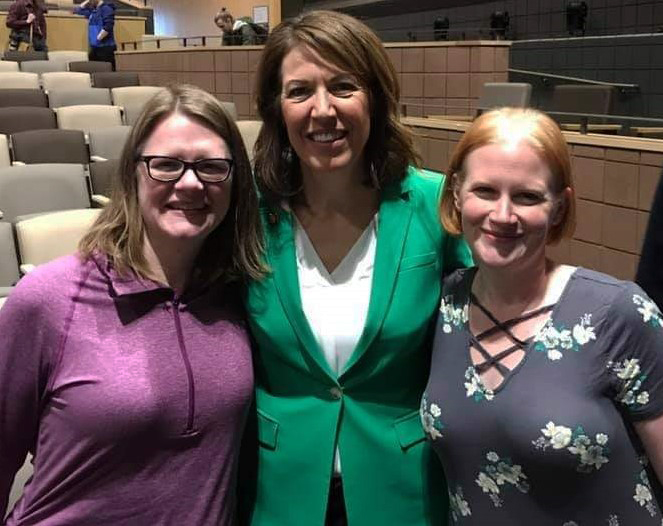
I reached out to all the Iowa legislators and helped to get Iowa 100% in support of ELSA and am slowly trying to help gain co-sponsorship from other legislators.
What Inspires Me
I’ve been attending NFED advocacy days and rare disease days on the hill as well as asking legislators for meetings to advocate for ELSA. Before COVID, we attended some town halls to speak with and thank our local legislators.
I have greatly enjoyed the NFED’s Advocacy Days on Capitol Hill. They are an opportunity to listen to other families and hear their stories as well as speak with legislators from across our country.
As my kids have got older (Lucas just turned four and Amelia is almost six), I’ve gained a stronger understanding of just how important ELSA is to this community. We are at the very beginning of our dental journey (Amelia will hopefully get her first partial denture before summer is over) and do not yet know what our insurance will or will not cover.
But, for me, it’s not just about helping our family, but helping all the families out there struggling to cover the cost of medical/dental bills to ensure their families receive all the necessary treatments. It is reading and hearing the stories of what families are going through on top of everything else that comes with the diagnosis that truly drives my desire to do what I can to help.
Pushing Beyond My Comfort Zone
Honestly, I don’t feel like I’m volunteering and wish I could do more to help. The NFED is truly a community/family and the support is part of being family. Meeting other families and hearing their stories took me from a place of shock/fear/what do we do, to a place of acceptance and support that I don’t know how we would’ve made it this far without.
The most challenging moment for me as an NFED volunteer was my first solo advocacy call. Jen had been with me for everything I had been doing up to this point and I remember being terrified. Senator Chuck Grassley’s staffer said that she would call me and that he would be on the call.
So, when I answered my phone expecting her and it was Senator Grassley himself, I was frozen in fear and thankful I had written out everything I wanted to say. Halfway through the call, I was a crying mess stumbling through our story as he listened and told me he would look into it further. That is a moment I will never forget and proved that I was capable of more than I ever thought. He went on to co-sponsor the bill!
I am an extremely shy and introverted person and if you told me five years ago I would be doing any of this, I’d probably laugh and not believe a word of it. My grandma likes to remind me of just how much I’ve grown because of this.
My children, their hypohidrotic ectodermal dysplasia diagnosis, and ELSA are about the only things I can easily start a conversation on with a stranger. But, it feels good to share and educate others. It has taught me that I’m capable of more than I ever thought possible and given me the strength to stand up and advocate for my children in all aspects of their lives.
Stronger Than I Imagined
I can’t understand why anyone wouldn’t want to volunteer and help other families. Our lives would be so much different if we hadn’t found the NFED and this community. I have learned so much from everyone and my children have learned that they are not alone. We are stronger together.
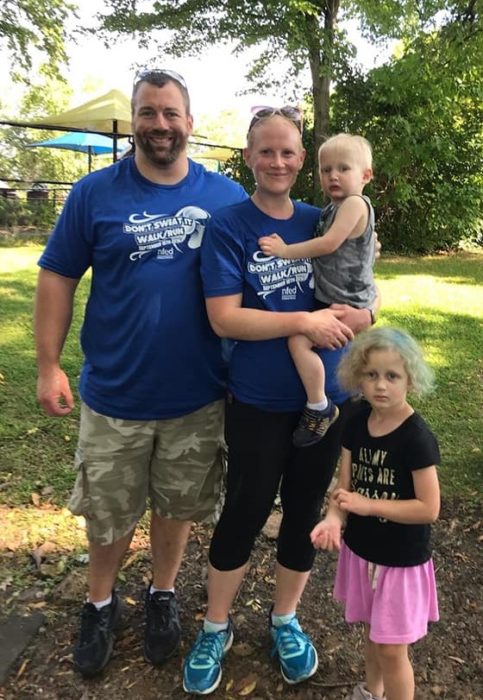
My grandma asked me to order her an NFED Rise up for Rare t-shirt so that she can wear it around her friends and educate them all about her great-grandchildren. It makes her so proud to be able to do that and she loves telling me what people say and learn.
Right now, my goal is to do anything I can to help get ELSA passed.
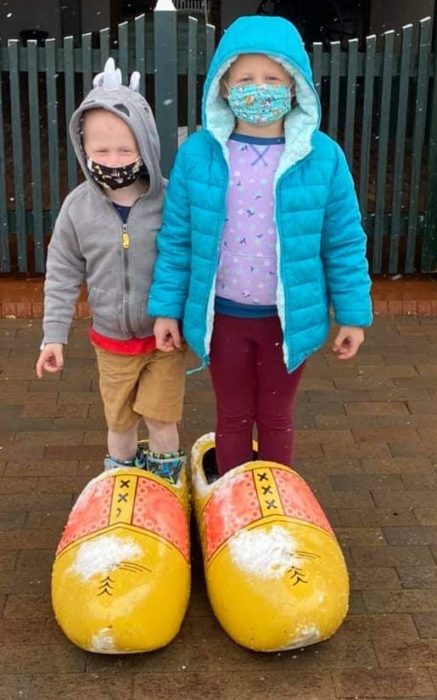
I’ve learned more about our government and how things worked than I ever learned in government classes in school. Our votes and voices truly do matter! My love for my children and to be their voice has made me stronger than I ever thought possible. You can achieve anything with the right motivation!
Sarah Ward is a guest blogger and volunteer for the NFED. She and her family live in Iowa where she enjoys gardening and working on puzzles with her two children.
Would you like to volunteer for the NFED? Explore ways you can help!
Volunteer